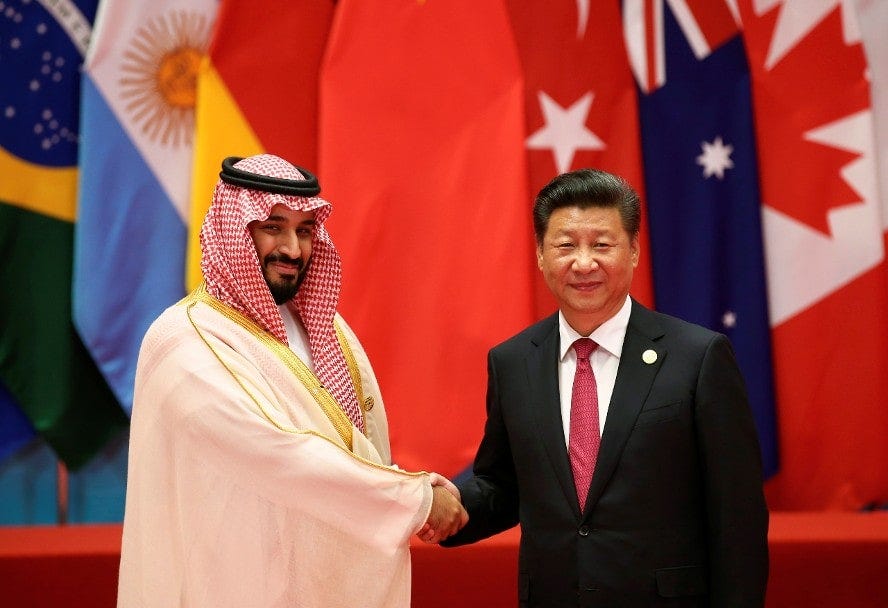Research - The Fraying World Order, Part 1
The existing world order is under stress and things are changing in profound ways. One of which is Saudi Arabia's tacit defiance of US foreign policy and its gradual pivot to the East.
As we emerge out of the global pandemic, a pervasive but impalpable feeling of unease has taken hold of the world. We all feel it. Something seems off, but we can’t quite put our finger on it.
A land invasion in Eastern Europe, strained global supply chains, soaring inflation, food riots in Sri Lanka and Iran, large scale farmer protests in the Netherlands, the resignation of British Prime Minister Boris Johnson, and yesterday’s shocking and tragic assassination of Japan’s ex-Prime Minister Abe Shinzo.
I could go on and on. The world is on edge.
About a week ago, the Director of the National Economic Council Brian Deese was asked by a CNN anchor, during an on-air interview, about what the Biden administration had to say to American families struggling with soaring gas prices. Deese replied, “This is about the future of the Liberal World Order and we have to stand firm”.
Unsurprisingly, this comment by the Director of the National Economic Council is very pertinent to the current geopolitical climate. The decades-long world order of cheap goods, easy money, and high growth that we’re so used to and love is starting to tear at the seams.
Two important areas where this is happening are the Middle East and Europe. In the Middle East, Saudi Arabia’s pivot East has serious implications on global inflation and the US Dollar’s role as the world’s reserve currency. In Europe, the EU is worried that a financial “Doom Loop” will fragment the fragile union.
To keep things short and digestible, this will be a two-part article. This first issue focuses on Saudi Arabia and its pivot East. The second issue, to be published next week, will focus on EU’s fragmentation fears.
Let’s begin.
If you use Gmail, be sure to check your Promotions tab for FinanceTLDR newsletter issues.
Gmail occasionally drops newsletter issues in there. It’s a common and mysterious pet-peeve for newsletter publishers. To make sure FinanceTLDR consistently hits your inbox, drag and drop our emails from the Promotions tab to the Primary tab.
Thanks for sticking with FinanceTLDR! We greatly appreciate your readership.
Saudi Arabia’s Pivot East
To put it directly, the US and Saudi Arabia’s decades-long alliance is probably in its worst state since the alliance’s genesis in 1974.
The ordinarily cozy relationship between the world’s foremost liberal democracy and a desert monarchy underpins the global oil market and the US Dollar’s role as the world’s reserve currency. A breakdown in relations could upend the global status-quo and cost the US deeply.
This is why Saudi Arabia’s blossoming friendship with China is so concerning to US policymakers.
Before explaining further, we need some context. Let’s quickly go over why Saudi Arabia is so important on the global stage, and how it got here.
The Making of an Oil Kingpin
The fascinating origins of Saudi Arabia’s path to the forefront of the global stage began with the Yom Kippur War in 1973 when several Arab countries invaded Israel. The US sided with Israel and supplied the burgeoning nation with weapons, ammo, and intel. In retaliation, OPEC, led by Arab countries, collectively cut oil production by a quarter. This skyrocketed oil prices from $3 per barrel to as high as $17 per barrel.
Soaring oil prices caused soaring inflation in the US and Europe. In response, the Federal Reserve rapidly raised its interest rate from a low of 3.30% in 1972 to almost 13% in 1974 to fight inflation.
Sounds familiar to today’s problems, doesn’t it? As the popular saying goes, history doesn’t repeat but it often rhymes.
To no one’s surprise, OPEC’s oil price diplomacy was unacceptable to the US and the White House scrambled to find a solution. Israel must win the war, and OPEC must behave. Several ideas were floated, including the worst case scenario of invading Saudi Arabia since it was OPEC’s de facto leader as the group’s largest oil producer.
Ultimately, and thankfully, a peaceful solution was found. A US delegation secretly went to Saudi Arabia in 1974 and struck a deal with the kingdom where the US would guarantee the security of Arab OPEC countries, such as through the sales of high-end weaponry, in exchange for OPEC selling oil exclusively in dollars and reinvesting those dollars in US Treasuries and US bank deposits.
This deal solidified the US Dollar’s role as the world’s reserve currency despite the abrupt end to the Gold Standard in 1971. As such, the US’s access to cheap imports, cheap energy, and cheap debt continued (AKA endless fuel for rapid economic growth). OPEC governments, on the other hand, stayed safe while getting unimaginably rich.
A win-win solution for all parties involved.
Deteriorating Relations
Ever since the 1974 deal, US-Saudi relations have mostly been warm, cozy, and stable. That is, until the past decade when relations rapidly declined as US priorities shifted. A few reasons for the rift:
The US government’s intensifying anti-fossil fuel rhetoric.
The US shale boom that turned the country into the world’s top oil exporter, thereby reducing OPEC’s dominance.
The Iran-US nuclear negotiations and the US acknowledgement of Iran as a leading regional power.
The release of a top-secret 28-page section of the 9/11 Commission Report that clearly revealed links between members of the Saudi royal family and the 9/11 hijackers.
The US’s unyielding support of Israel as it encroached on more and more Palestinian territory.
The main cause of contention, however, was the unexpected ascension of the brazen, intensely ambitious, and politically shrewd Mohammed bin Salman (MBS) to Crown Prince. With King Salman having unofficially taken a back seat to government affairs, the newly minted Crown Prince had also become the de facto ruler of the kingdom.
Awkwardly, MBS, who is the king’s son, is not favored by the US for this role. The more subdued king’s nephew, Mohammed bin Nayef (MBN), is preferred. MBN was actually appointed Crown Prince in 2015 but, two years later, was ousted and replaced by MBS through Game of Thrones-style palace intrigue… much to the chagrin of US policymakers.
From the get-go, MBS had no intentions to play lapdog to the US. The most brazen example of this was the assassination of Saudi Arabian journalist and dissident Jamal Khashoggi in a Saudi embassy. Khashoggi, being an effective opposing voice to MBS, was likely an important asset to the CIA. This was probably why the agency took a leading role in investigations and ultimately accused MBS of ordering the heinous operation.
As a result, Biden vowed in 2019 to make Saudi Arabia "pay the price, and make them, in fact, the pariah that they are”. Since becoming president, Biden has continued to hold this view.
US’s Losses, China’s Gains
US’s losses have become China’s gains. Just as the US started drifting away from the Saudis over the last decade, China started warming up to them (and OPEC in general):
In 2014, Qatar agreed to be the first hub for clearing transactions in the Chinese Yuan.
In 2015, the United Arab Emirates (UAE) and China created a new currency swap agreement for the Yuan.
China has become Saudi Arabia’s largest crude oil customer, forming a quarter of the kingdom’s oil exports.
China has also increased its arms transfers to Saudi Arabia by 386 percent in 2016-2020 when compared to 2011-2015.
Saudi Arabia is also heavily integrated with China’s Belt and Road Initiative (BRI), being a top-three destination for BRI construction projects.
China-Saudi relations experienced a noticeable inflection point over the last year as the nascent Biden administration mounted pressure on MBS:
This January, Saudi deputy defense minister pledged to deepen military relationships with China.
Around the same time, the Saudi foreign minister led a delegation from Kuwait, Oman, Bahrain, and the Gulf Cooperation Council to Beijing.
In March, the Saudi and Chinese foreign ministers met in Pakistan and in the same month, it was reported that Saudi Arabia is considering denominating its oil trade in Yuan. This is a massive threat to the US Dollar’s world reserve currency status and a brazen breaking of the 1974 deal.
Last month, it was reported that BRICS, the China-Russia led coalition of countries intended to be an alternative to the Western-led G7, has extended an invite to Saudi Arabia and a few other nations to join. The kingdom is mulling on a decision.
In addition, Saudi Arabia and the UAE were slow to condemn the Russian invasion and have implicitly sided with Russia by not raising oil production to compensate for Western sanctions on millions of barrels of Russian oil. This tacit defiance of US foreign policy has prompted US media outlets to pen articles with titles like “Biden Should Punish Saudi Arabia for Backing Russia” (Foreign Policy magazine).
It’s clear the Saudis are subtly threatening the US by improving their relations with China and Russia. In doing so, they’re likely trying to draw significant concessions from the Western hegemon. Just a decade ago, this would have been an unimaginable geopolitical maneuver for the oil-rich kingdom but the US’s weakening global role and China’s rise has given traditionally staunch US allies a seriously viable alternative.
So What?
Saudi Arabia’s blossoming friendship with China and soaring energy prices in the US and Europe have forced Biden to the bargaining table. Having given MBS the cold shoulder since coming to office, Biden finally relented and is flying to Saudi Arabia to meet MBS in-person next week.
At a high level, Biden needs to repair US-Saudi relations. Surgically, he hopes to get OPEC to increase oil production and lower global oil prices. This should reduce global inflation and improve morale in Western countries, making it easier to maintain the war effort in Eastern Europe.
This olive branch might be too little too late, as French President Emmanuel Macron was overheard on the hot mic at the G7 Summit last month telling Biden that the UAE and Saudi Arabia were unable to substantially increase oil production.
Regardless of whether OPEC raises oil production, Biden’s in-person meeting with MBS is vitally important to US foreign policy and he needs to pull out all the stops to repair US-Saudi relations and pause or even reverse Saudi Arabia’s slide to the East.
Fin
Even though understanding macroeconomic trends and headwinds might not produce immediately actionable insights for traders and investors, it’s still valuable to have a general sense of where the world is headed. After all, the Federal Reserve is tuned to macro affairs and is, as we saw in the last two quarters, tremendously influential over asset prices.
I hope this article has been informative about the precarious situation the US is facing with Saudi Arabia. All eyes will be on Biden’s meeting with MBS later this month. In Friday’s issue next week, we’ll discuss the EU’s fear of a financial “Doom Loop” fragmenting the fragile union.






